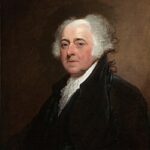In 1798, President John Adams made one of his most controversial decisions during the Quasi-War with France. Adams authorized Alexander Hamilton to build a massive provisional army of 10,000 soldiers. This decision created Hamilton’s Army despite minimal French threats to American territory.
The Hamilton’s Army Decision
The Quasi-War with France provided the backdrop for this military expansion. Naval conflicts in the Atlantic had escalated tensions between America and France. However, no immediate invasion threat existed on American soil. ⚠️ Adams still permitted Hamilton to recruit thousands of soldiers for domestic deployment.
Military Leadership Structure
Hamilton became the army’s Inspector General with significant operational control. George Washington served as nominal commander-in-chief but remained largely inactive. This arrangement gave Hamilton unprecedented military authority during peacetime. The federal government had never maintained such a large standing army before. 📊 Military spending increased dramatically to fund this controversial force.
Constitutional Concerns
Critics argued that Hamilton’s Army violated American principles of limited government. The Constitution emphasized civilian control over military forces. Many feared this army could suppress domestic political opposition. 💰 The enormous costs also strained federal finances during an already difficult period.
Impact:
Hamilton’s Army created lasting political divisions that shaped American history for decades. The decision fundamentally altered public trust in federal military power and influenced future presidential elections.
Political Party Divisions
The army decision deepened the split between Federalists and Democratic-Republicans. Jefferson’s supporters viewed Hamilton’s Army as a tool for political oppression. 🔥 This controversy contributed significantly to Adams’ electoral defeat in 1800. Many Americans began questioning Federalist commitment to republican government principles.
Constitutional Precedent
The decision established dangerous precedents for military power during peacetime. Future presidents would reference this controversial expansion when justifying their own military decisions. The army’s existence challenged traditional American suspicions of standing military forces. 📉 Public confidence in federal restraint declined substantially among many citizens.
Economic Consequences
Military expenses consumed enormous federal resources during the army’s brief existence. Taxes increased to fund soldier salaries, equipment, and training facilities. The financial burden created additional public resentment against Adams’ administration. Small businesses and farmers felt the economic pressure most severely.
Long-term Democratic Impact
The controversy strengthened American traditions opposing large peacetime armies. 🌍 International observers noted how the decision damaged America’s republican reputation abroad. This military expansion became a cautionary tale about executive overreach during national emergencies.
